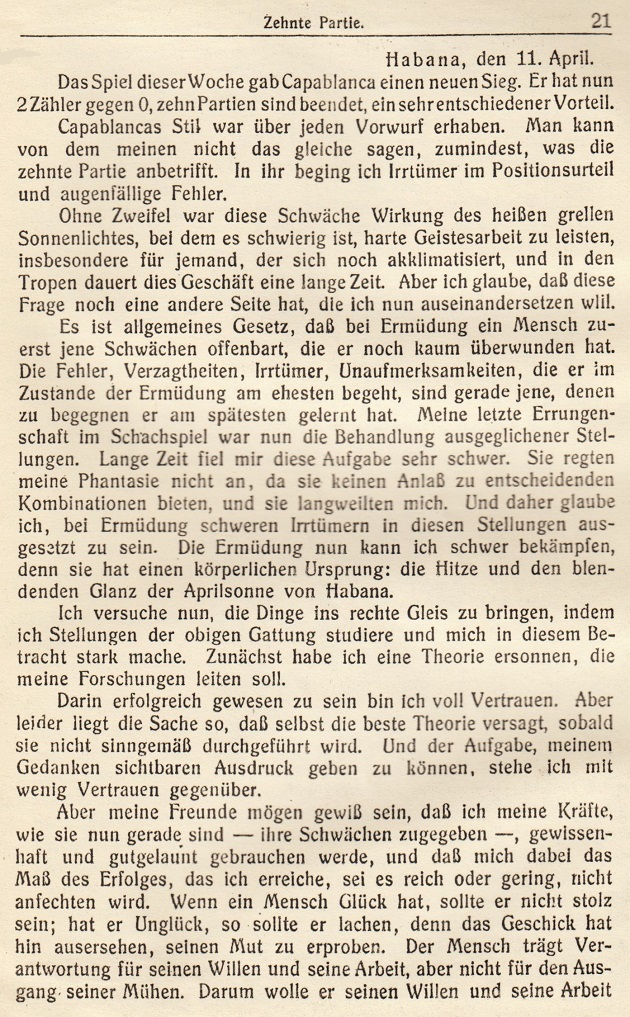
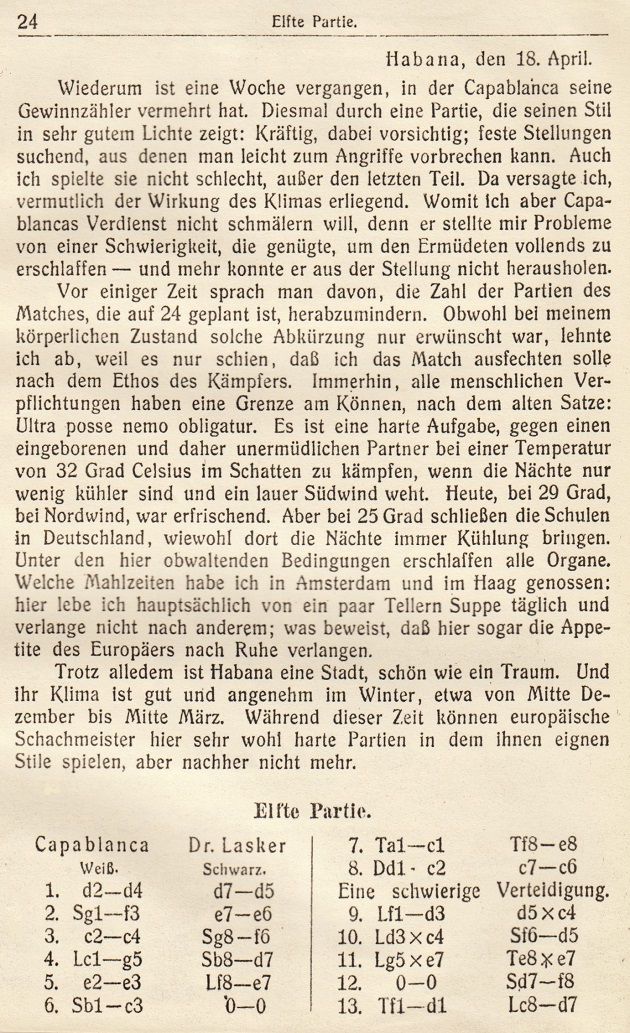
Edward Winter
The article below by Capablanca was published on pages 376-380 of the October 1922 BCM, in reply to the account of the 1921 world championship match written by Lasker in Mein Wettkampf mit Capablanca (Berlin and Leipzig, 1922).
‘Dr Lasker in his recent book of the championship match at Havana makes such misrepresentations of facts that they cannot be allowed to pass unchallenged. He distorts the truth and at times suppresses it. Of his opinion as to the games I shall say nothing, save that he is unable to show a single instance where he could have won a game. That in itself is sufficient. The same could not be said of any other match ever played. That he made some blunders is evident, but he did so also against his other opponents in previous matches, only they made more than he did. That he played weakly at times is also true; had he played always the best he would not have lost. That is also evident, but such is the natural course of events in every match: the one who plays better always wins. The one outstanding feature of the match and the one that most critics overlook is that not once did he have a won game. A feat to be very proud of, as up to the present it is unique in the annals of championship matches. Dr Lasker goes too far when he claims that I spread false reports about Havana having made an offer of $20,000. His insinuations on the subject are clearly an attack against my honesty and good faith. Such charges without proofs, as in this case, are contemptible. I have had infinite patience in all my dealings with Dr Lasker, and put up with a good many things out of respect to his age and his many years as world’s champion, but such insinuations are absolutely inexcusable.
My answer is not in the order of a controversy. The object is to put once for all before the public the true facts concerning this often debated affair. Thus chess historians will have true premises from which to draw their conclusions.
Now as to the facts themselves: –
At the end of 1911, I challenged Dr Lasker for the championship and asked for his conditions. Dr Lasker replied, sending a set of rules, which can be found in any of the chess periodicals of the time. I replied by letter directly to Dr Lasker, calling his attention to the fact that one of the conditions was “obviously unfair”. Dr Lasker claimed that he had been insulted by my using this expression and did not have the courtesy to reply to me by letter. Instead, he replied through the press and said he would not play with the man who had insulted him. It was, therefore, Dr Lasker and not I who used the press to answer his opponent. He stated in the same press that if I was not satisfied with his decision he would leave the matter to Mr W.P. Shipley for arbitration. (This fact Dr Lasker suppresses in his story of the match.) Although Dr Lasker had not answered my letter, but merely used the press to give vent to his humour, I submitted the case to Mr Shipley, who wrote to Dr Lasker: “That he saw no reason why the negotiations should not be continued and an agreement reached between us.” A very diplomatic way to tell Dr Lasker that he was wrong. Dr Lasker’s answer was characteristic. He wrote again another press article, saying that Mr Shipley might think what he liked, but that he (Dr Lasker) thought differently and that he would not in any case play with me after what had occurred. Thus, Dr Lasker named his own arbitrator, and when this arbitrator did not agree with him he put him aside. Later on Dr Lasker wrote several more press articles, in which disparaging remarks were made about me. Meanwhile I never wrote anything for the press. It is evident, therefore, that whatever insults there were came all from Dr Lasker. Now as to the second negotiations.
In 1919, while in London, I received a letter from the Netherland Chess Association, asking me whether I would be willing to play Dr Lasker and, if so, under what conditions. I replied immediately that I would be very glad to play for the championship and suggested that a meeting should be arranged in Holland to discuss the matter personally. After a long delay, when I had practically given up all hope, I received word that Dr Lasker would meet me at The Hague. There an agreement was reached in January 1920, whereby besides the return travelling expenses and living expense of both players, no purse below $8,000 could be considered. It was also agreed that we would play where the best offer was made. I went immediately to Spain, where an offer was made to me. From Spain I went to New York City, where I took up the matter with some of my friends. Then I finally went to Havana, where I had heard that my countrymen wanted the match to be played. I obtained from Havana a much better offer than I had been tendered anywhere else, and just as I was on the point of communicating with Dr Lasker about it, the cable brought the news that Dr Lasker had resigned the championship, which, according to one of the clauses of our agreement, made me the world’s champion. This same clause existed in the agreement entered into in 1913 between Dr Lasker and Rubinstein for a match for the world’s championship. There is no other fair way to arrange this matter; if the champion accepts a challenge and afterwards does not play, although his challenger has meanwhile stood by the letter of the agreement, the title of champion must go to the challenger. Any other arrangement would be most unfair to the challenger. Nevertheless, I preferred to play rather than to come to championship honours without actually winning them over the board. To that effect I made a second journey to Holland (this time all the way from Cuba), to put the matter before Dr Lasker, to whom, meanwhile, I had written about Havana’s offer, and asked him at the same time to meet me at The Hague. There, in August, a second agreement was reached, pending the receipt by Dr Lasker before 10 September of a letter guaranteeing the purse. I left for Paris, where I had the good fortune to meet Señor R. Truffin, president of the Union Club, one of the contributors to the purse and incidentally the treasurer of the funds. Immediately, a duplicate letter was sent to Dr Lasker (one to Berlin and the other to The Hague), guaranteeing the purse. This letter was signed by Mr Truffin. The existence of this letter is suppressed entirely by Dr Lasker in his book, probably because, as in the case of the first negotiations of 1911 regarding Mr Shipley’s letter, its mere mention would overthrow his whole case, which is built on very little fact and a great deal of imagination, to say nothing else. That he considered Mr Truffin’s letter sufficient guarantee was shown by the fact that he immediately wrote me a letter to that effect. Unfortunately in this letter he also wrote that he wanted a number of things that were nothing in fact but a lot of new demands, for which there were no grounds whatever in the articles which he had just signed. These demands were of a totally absurd character and might have been considered insulting. Although the match was only to start on [sic] January 1921, he demanded that $3,000 should be put at his disposal in Amsterdam some time in October 1920. Then that $4,000 more should be paid to him 24 hours before the match started. The reader can draw his own conclusions about this matter. Such demands could certainly be construed as an insult to the good faith of the generous contributors to the purse. Dr Lasker in return offered no guarantee whatever except his word. Dr Lasker wrote a similar letter to Judge Ponce, which elicited the reply given by Dr Lasker in his book of the match. Since Judge Ponce had nothing to do with the financial arrangements of the match, he could not, of course, satisfy Dr Lasker’s demands. Besides, at the time, Judge Ponce was not aware of Mr Truffin’s letter, else he probably would have told Dr Lasker to address himself to Mr Truffin.
I was still in Europe when I received another letter from Dr Lasker and, fearing that the match might not take place, I made a third journey to The Hague, where at a final meeting I told Dr Lasker that if he wanted to play the match I thought I might be able to arrange the whole matter, that the money was fully subscribed and would be there when the match started, but that I doubted if the Cubans would put up with all of his demands, that the only thing that could be done was for Dr Lasker (since he insisted on his new demands) to wait until I reached Havana, in December, and could personally take up the affair. Once in Havana, I arranged a meeting where I obtained, “in order to give Dr Lasker no chance to evade the match”, that Mr Truffin should send the cable-message mentioned in Dr Lasker’s story. The cable was sent 24 December 1920, yet Dr Lasker replied that the match would commence 10 March! Why such a delay? He does not say it in his book, but the fact is that he attempted to go to the United States of America first (probably in order to make money to pay his way over), and only when he failed in that did he take the direct line.
For what follows it must be borne in mind that Dr Lasker had been in Havana twice, in previous years, giving exhibitions at the Havana Chess Club. Thus, it is only fair to assume that he knew the climate he was going to encounter. At any rate, it was not entirely unknown to him. In his letter of 11 April, page 21, after he lost the tenth game, Dr Lasker complains of the sun. The games were played at night, between 9-0 and 1-0; the sun had been down for over two hours when play started! If during the day the sun bothered him, all he had to do was to stay at home and rest and wait for the late afternoon and early evening to go out.
Again in his letter of 18 April, page 24, he complains of the sun, and this time of the heat also. He claims for that afternoon a temperature of 32° C. in the shade. What a wonderful imagination!
Such temperatures do not exist in Cuba except in midsummer, in August, the hottest month of the year. He claims 29° C. at night, with fresh north wind. Again absurd. When the north wind blows in Cuba at that time of the year at night the temperature cannot be more than 20° C., and the probabilities are that the temperature would be below 20° C. In such cases one feels chilly. I remember that on two occasions we had to close the windows because the air was too cool, yet he claims it was too hot. It might be well to state right here that far from being used to hot weather, as most people think, I cannot stand it. The only two summers I have spent in Cuba since 1904 caused me serious illness. I have spent most of my life in very cold climates, and while I enjoy cold weather, hot weather makes me ill. The truth is that we played under the most ideal conditions imaginable. We played at the Casino, which is situated next to the country club and about three-quarters of a mile from the beach. We had a separate room with windows in three sides and gardens at the back, where we often walked while the other was thinking. A waiter was put solely for our use. We could have anything quickly and free of charge. We played only at night one session of four hours, from 9-0 to 1-0. The weather was excellent, not for a man of the tropics only, but for a European as well. I refer the reader to the introduction to my book of the match written by Mr H. Cassel, a German by birth, who has lived all his life in Germany, England and the United States of America. But enough of this; as stated before, Dr Lasker had been twice before in Cuba, knew perfectly well what he was doing, and if he did not begin the match before he cannot blame anybody but himself. Had he abided by his own signature as per our agreement of August 1920, the match would have started on [sic] January 1921 If Dr Lasker wants an excuse for his defeat, he should look for it where the facts are not against him.
Dr Lasker says in his book that he refused to have the total number of games reduced and clearly gives the impression that such a thing was proposed to him. The truth is that he was the first who spoke to me about it. Since I was ahead, I could not propose such a thing. Such an offer could only come from him who had a 0 score. I do not remember the details of this affair, hence I shall say no more. He also talks of food and loss of weight and claims I am tireless. I lost ten pounds and ate very very little, not because the food was bad, but because of the natural nervous strain attached to such a hard contest.
As to his illness, not being an M.D., I cannot say; all I know is that two or three days after the match was over, Dr Lasker sailed for Europe looking very well and cheerful, far, very far, from the sick man one would imagine after reading his book.’
From page 134 of The Human Side of Chess by Fred Reinfeld (New York, 1952), in the chapter on Emanuel Lasker:
‘He claimed that the climate had affected him adversely, whereas Capablanca’s praise of the climate sounded like plagiarism from a travel brochure. Who was right? Probably both men. The climate was probably unfavorable for a stranger, and an elderly man at that; and bearable to a native, who was 20 years younger.’
Lasker was aged 52 when he played the match, in March-April 1921. His remarks about the Cuban climate appeared in Mein Wettkampf mit Capablanca (Berlin and Leipzig, 1922), and two pages are shown here:


Those were the two pages specifically referred to by Capablanca in his response in 1922:
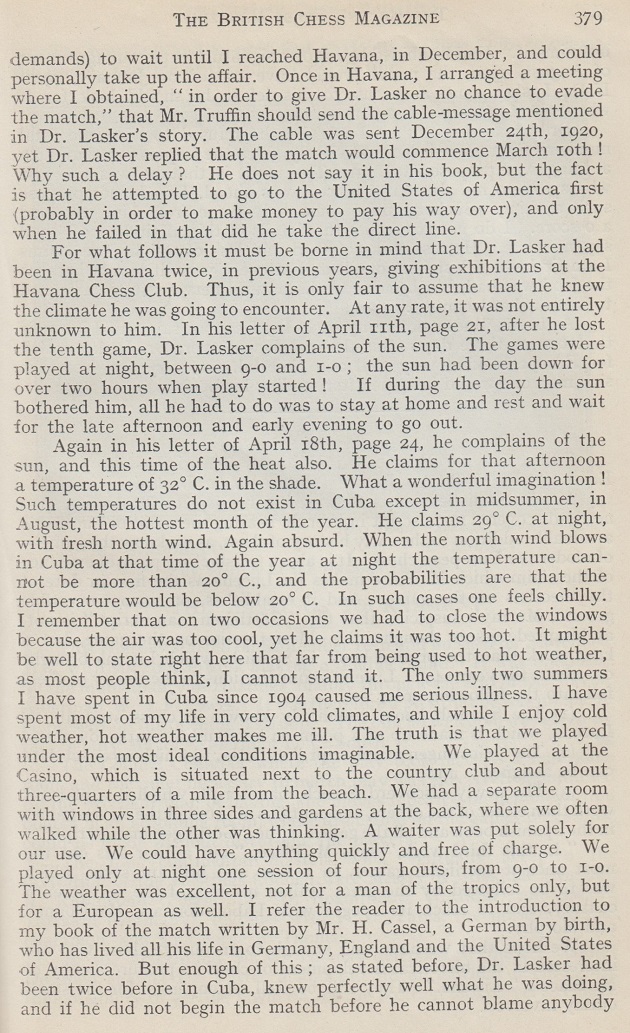
English versions of some despatches by Lasker from Havana were published in the Sunday Times in 1921 (see Lasker on the 1921 World Championship Match). He wrote a response to Capablanca’s BCM article, but the magazine refused to publish it (see page 37 of the February 1927 American Chess Bulletin).
In the archives of the Climate Center of the Institute of Meteorology in Casablanca, Havana, Yandy Rojas Barrios (Cárdenas, Cuba) has found day-by-day and hour-by-hour data on the temperature, relative humidity and winds in the Cuban capital in March and April 1921. For example:
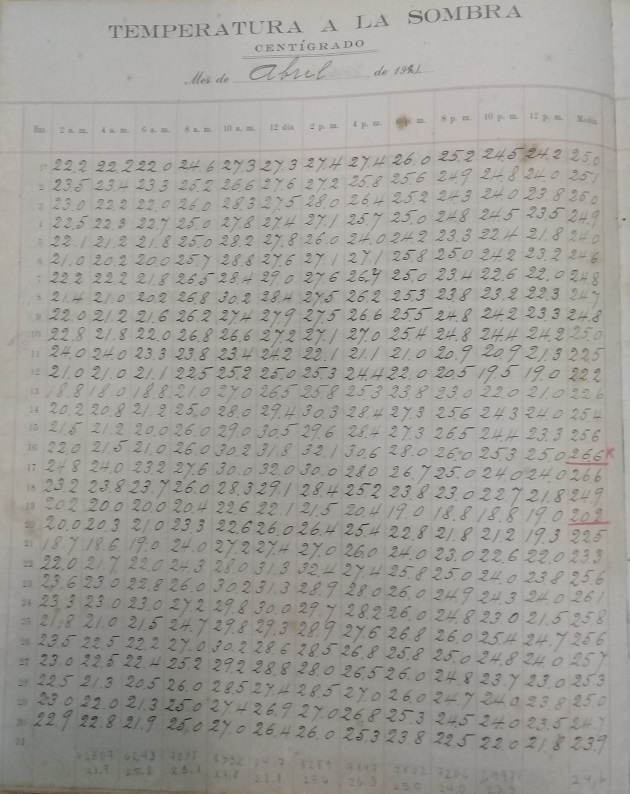
(11437)
The set of eight tables:
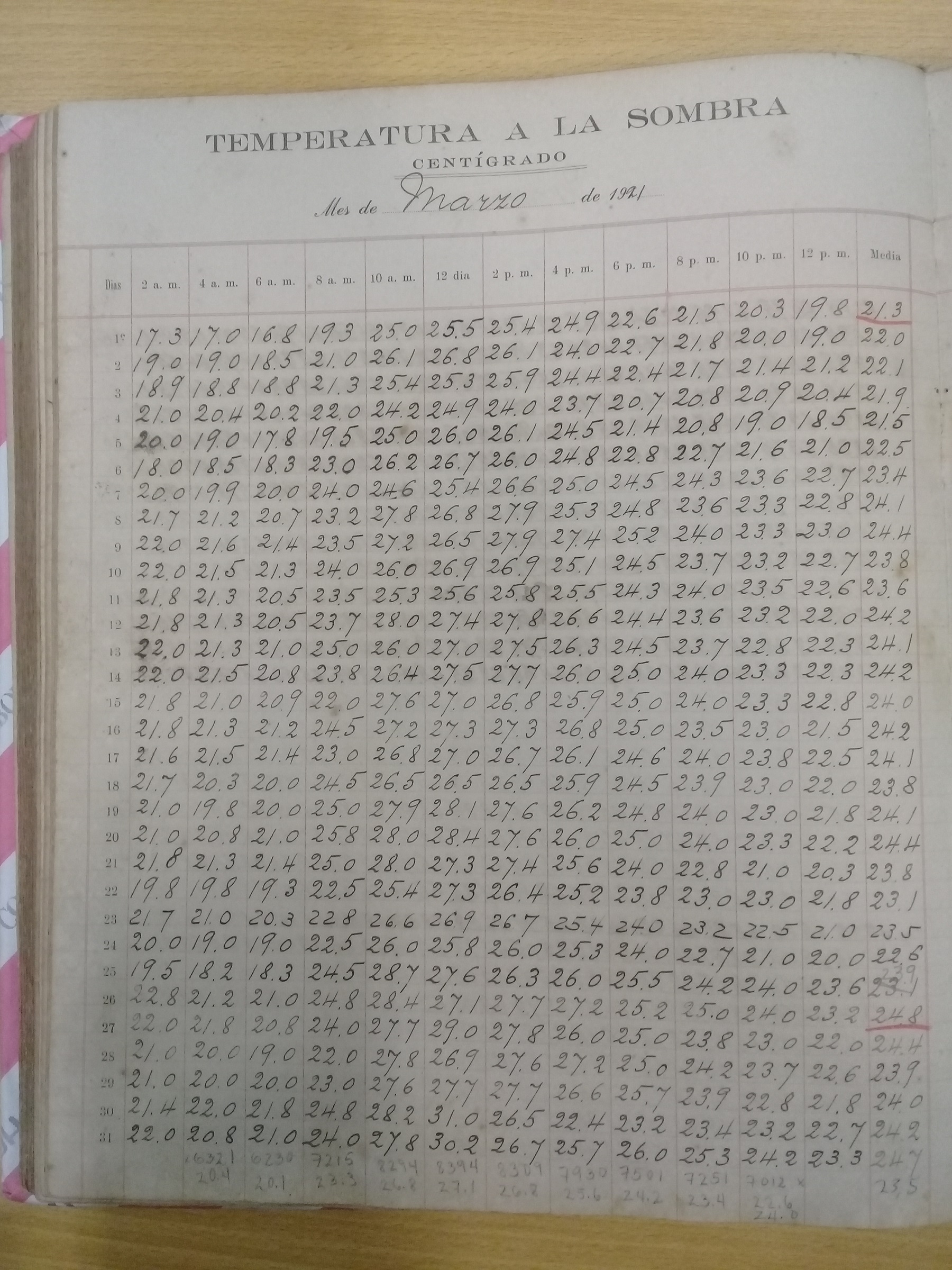
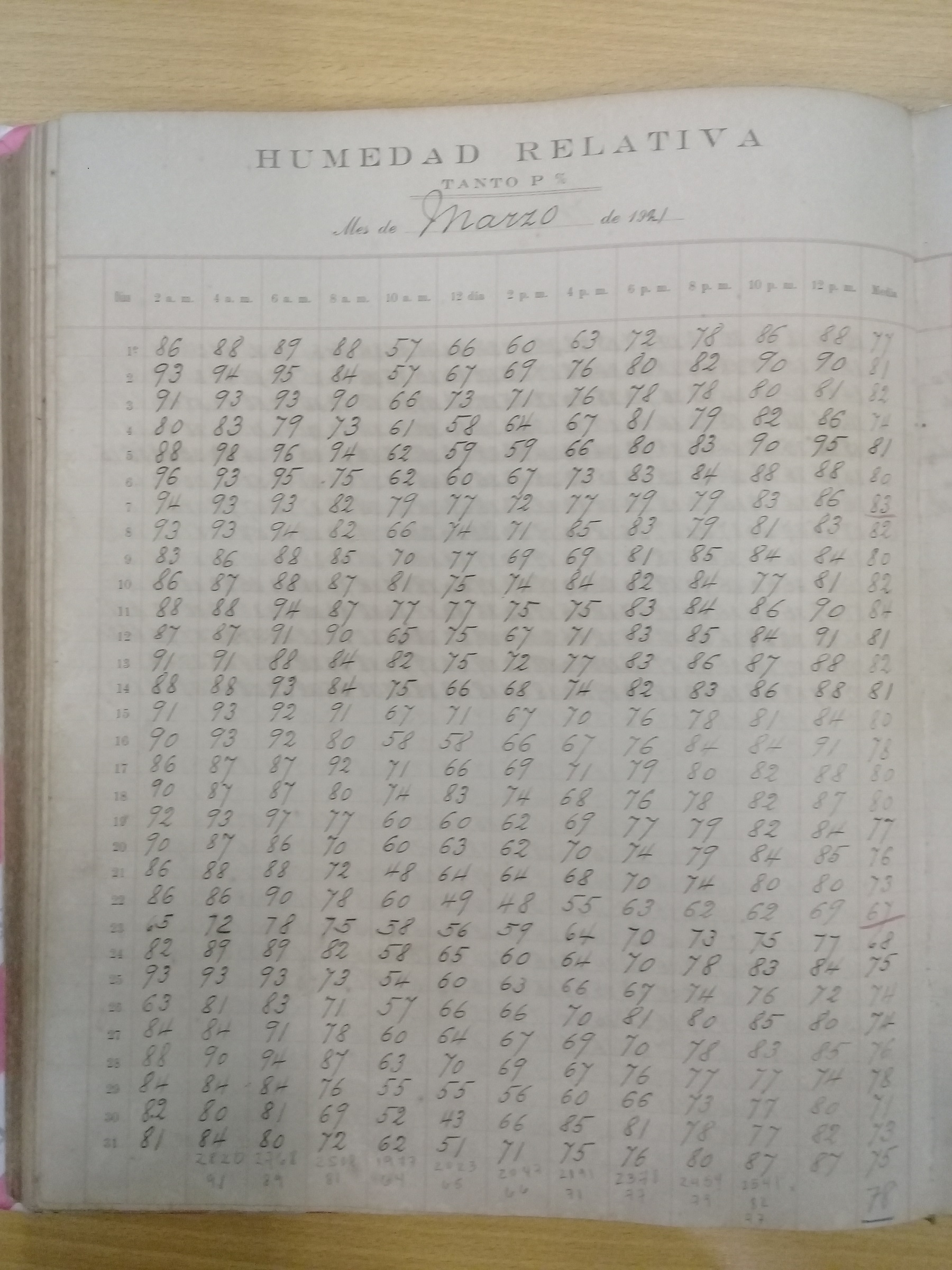
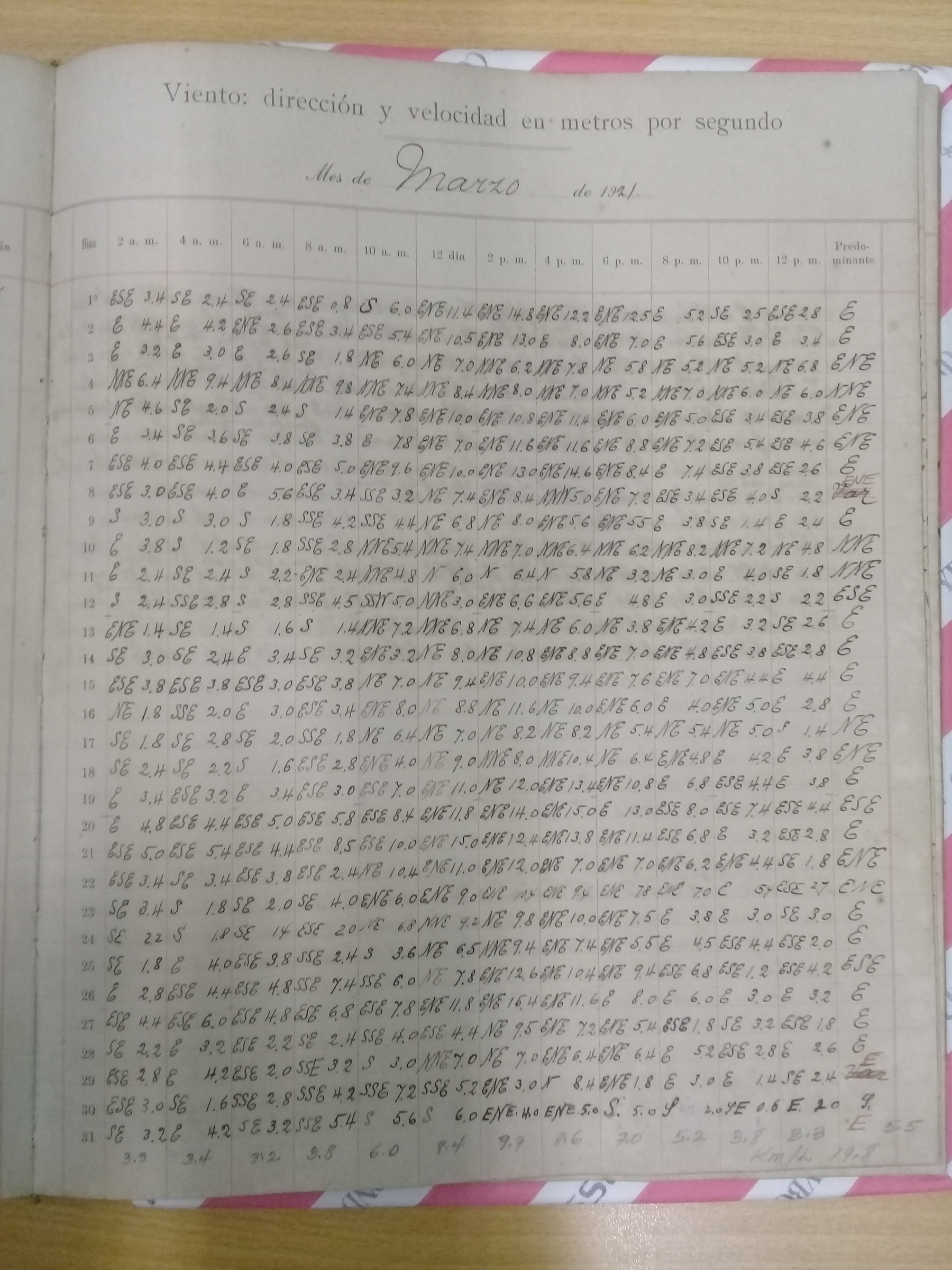
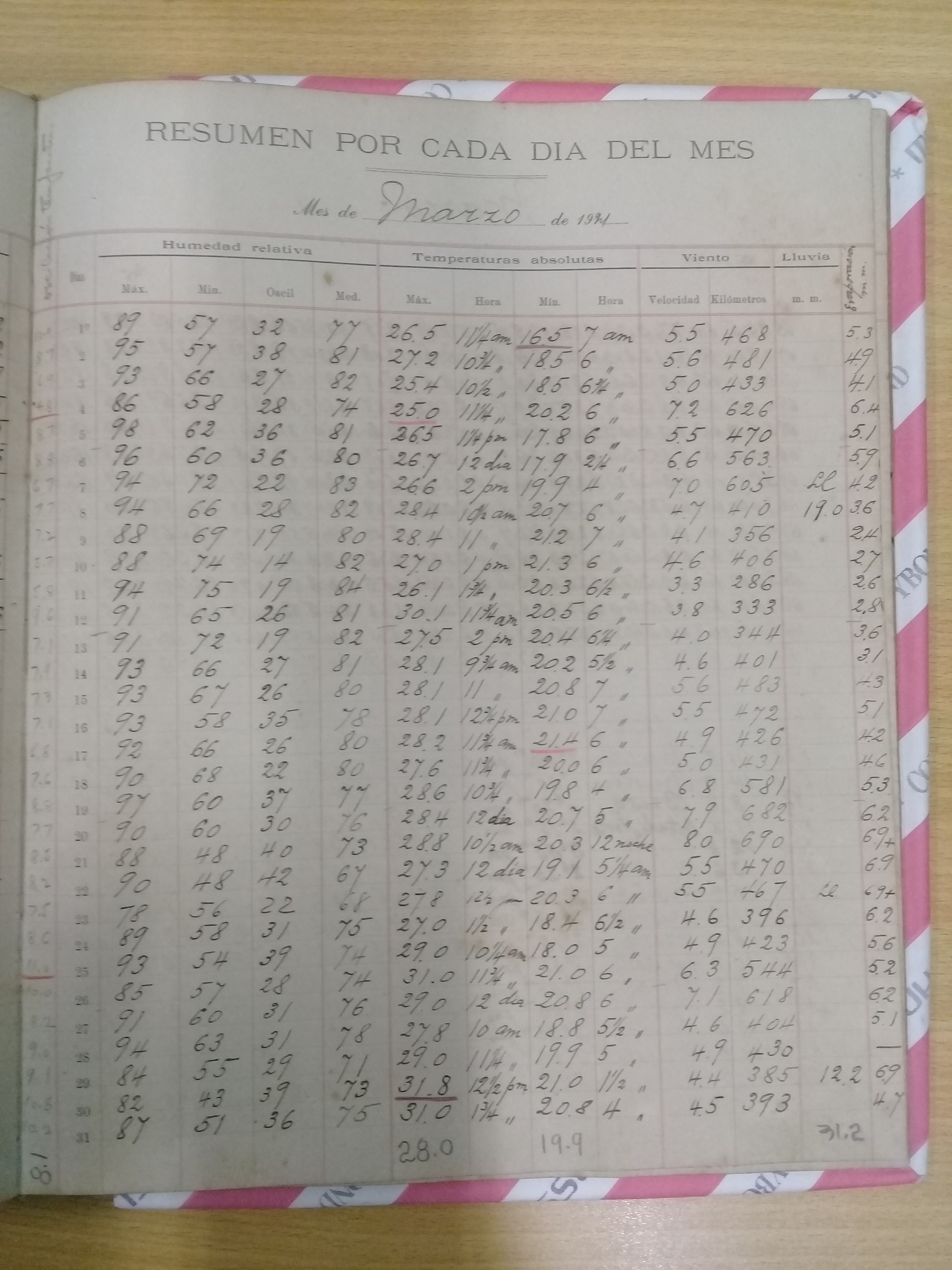
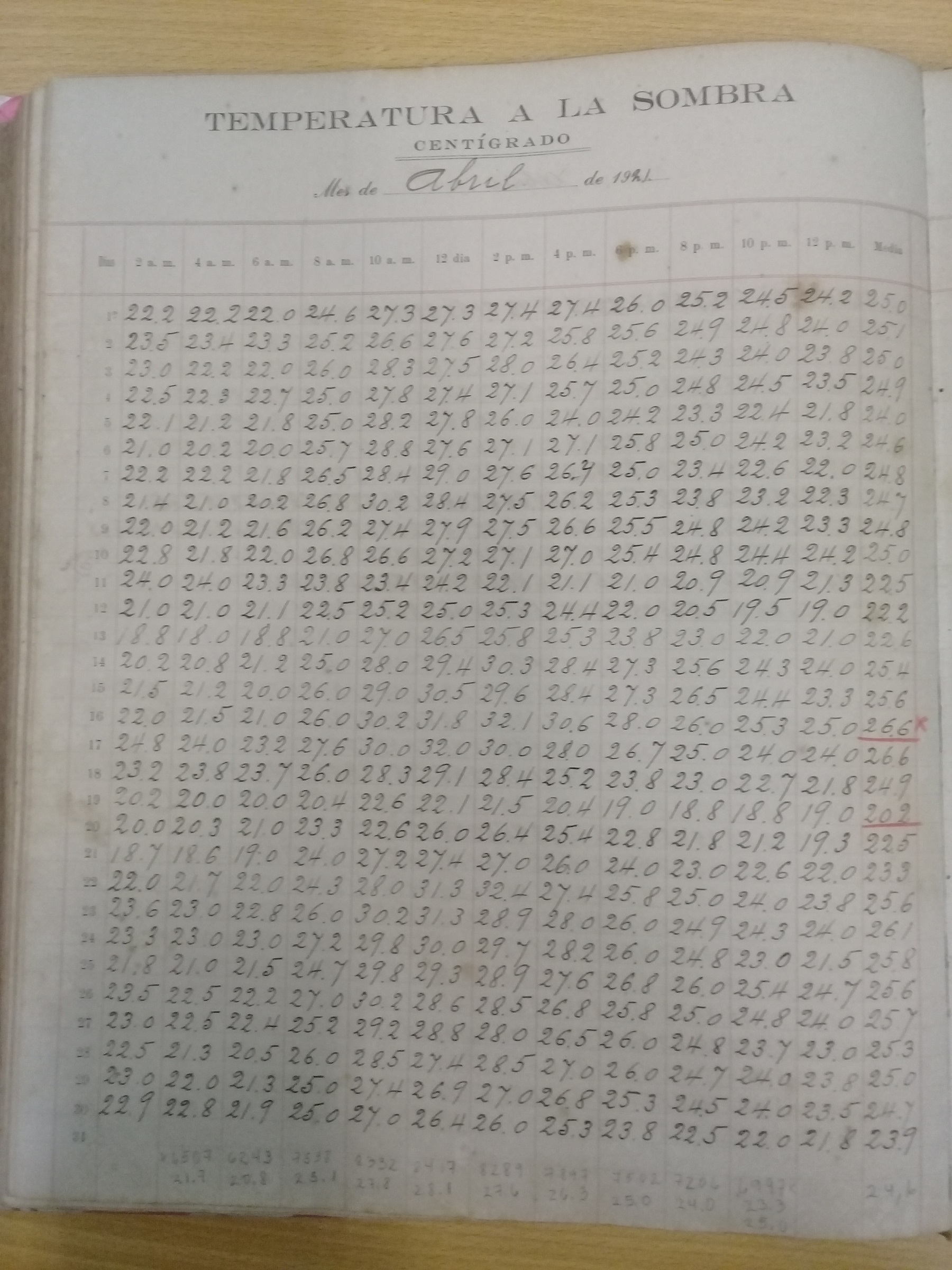
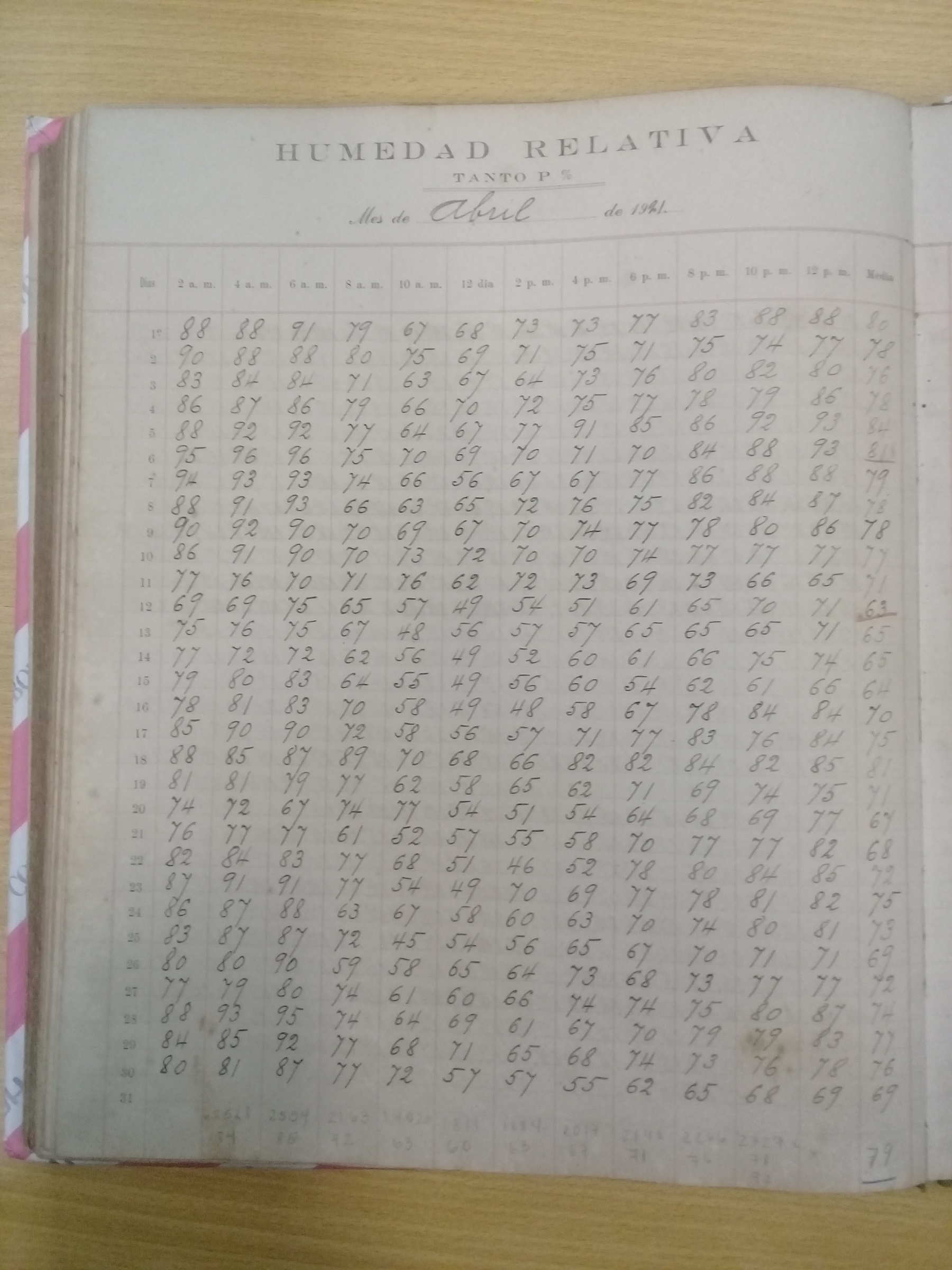
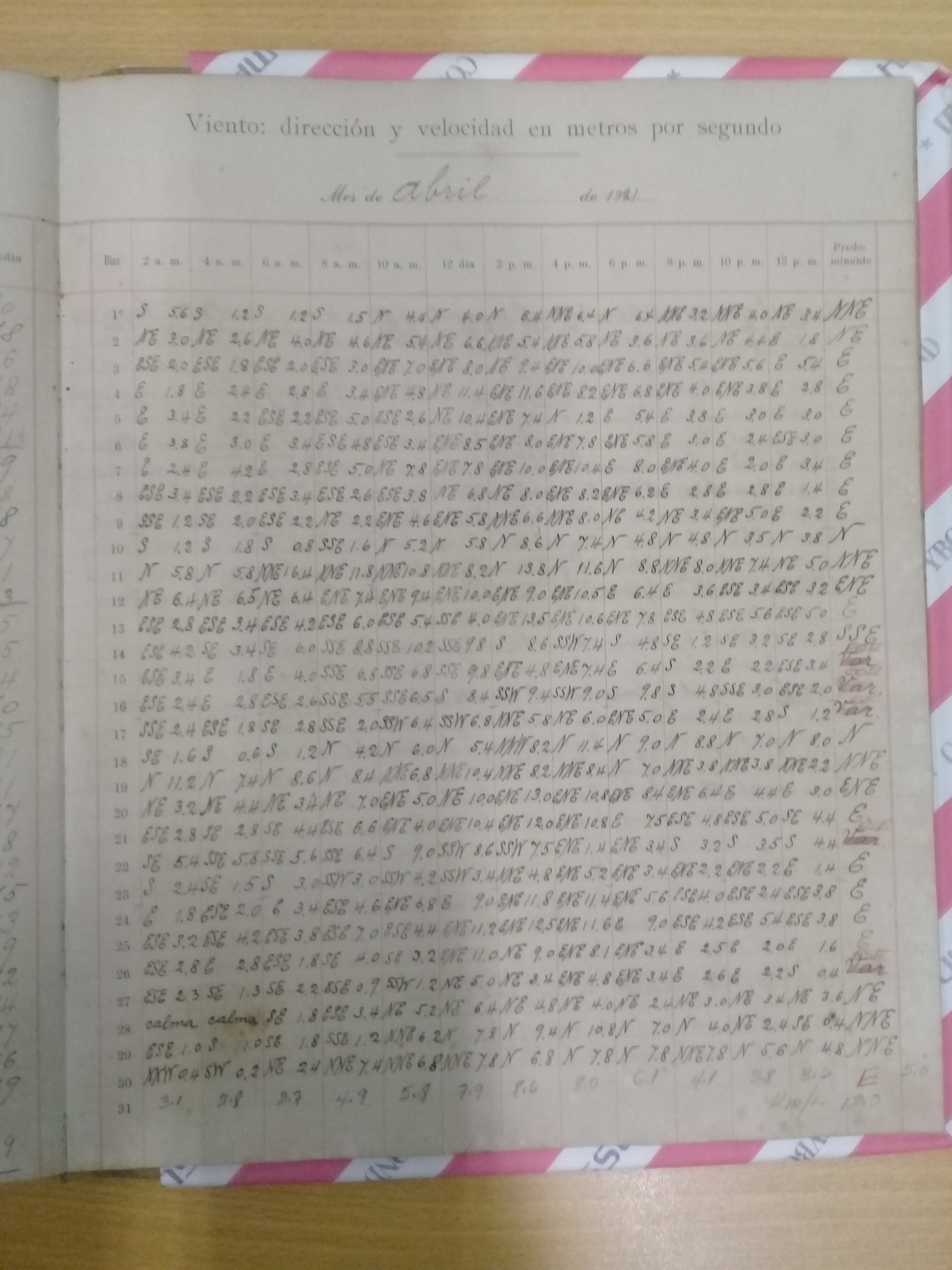
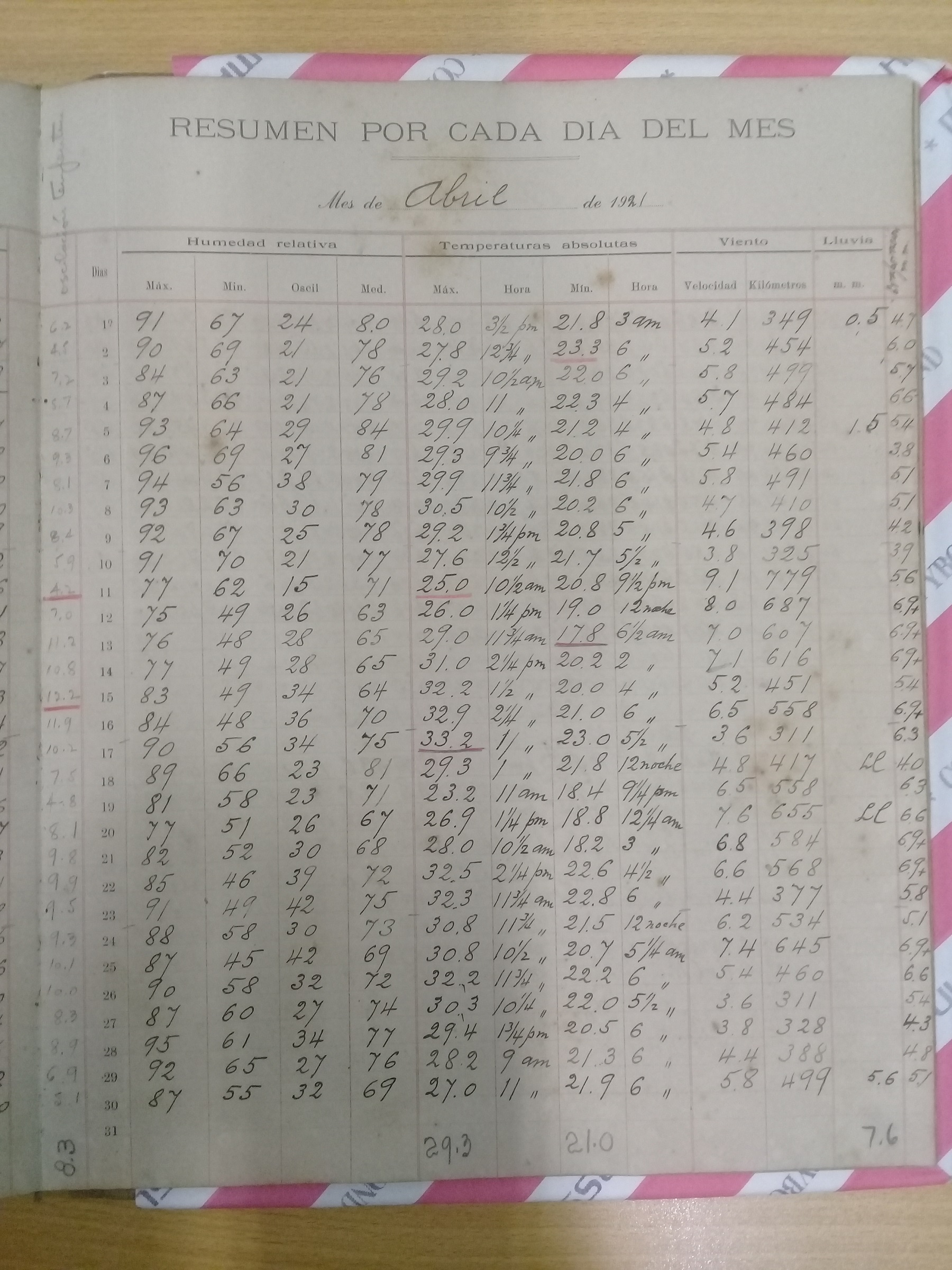
To the Archives for other feature articles.
Copyright: Edward Winter. All rights reserved.